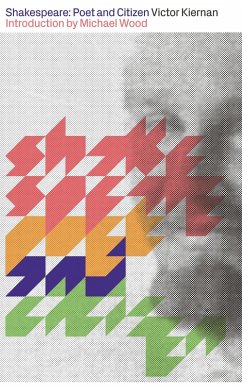'This book rests on a lifetime's thinking about history. It helps us see Shakespeare in "a more realistic light".'
Times Literary Supplement
Although Shakespeare is rightly celebrated for the continued relevancy of his plays and poetry today, we too often lose sight of the wider historical context which shaped his work. In Shakespeare: Poet and Citizen, Victor Kiernan shows that Shakespeare was profoundly sensitive to the great social and political upheavals of his age. Shakespeare's life coincided with the first challenges to the institution of monarchy, as well as far-reaching transformations in the social hierarchy.
By placing the plays within this context of an emerging modernity, Kiernan upends our perception of Shakespeare's writings. He shows that these social transformations, and especially the changing roles of women, are crucial to our understanding of the Comedies, in which the confusion of identity, disguise, and cross-dressing play a central role, while the Histories similarly reflect the demise of feudal allegiances and the development of the modern state.
Featuring a new introduction by Michael Wood, Shakespeare: Poet and Citizen provides a rich resource for both students of literature and for the general reader looking for new insight into the life of our greatest dramatist.
Times Literary Supplement
Although Shakespeare is rightly celebrated for the continued relevancy of his plays and poetry today, we too often lose sight of the wider historical context which shaped his work. In Shakespeare: Poet and Citizen, Victor Kiernan shows that Shakespeare was profoundly sensitive to the great social and political upheavals of his age. Shakespeare's life coincided with the first challenges to the institution of monarchy, as well as far-reaching transformations in the social hierarchy.
By placing the plays within this context of an emerging modernity, Kiernan upends our perception of Shakespeare's writings. He shows that these social transformations, and especially the changing roles of women, are crucial to our understanding of the Comedies, in which the confusion of identity, disguise, and cross-dressing play a central role, while the Histories similarly reflect the demise of feudal allegiances and the development of the modern state.
Featuring a new introduction by Michael Wood, Shakespeare: Poet and Citizen provides a rich resource for both students of literature and for the general reader looking for new insight into the life of our greatest dramatist.
'Victor Kiernan is one of the best historians of seventeenth-century England. And he is also a sensitive literary critic. The combination of these gifts makes his book a remarkable achievement. It will become a classic.'
Christopher Hill
'The strength of this book lies in the total view of political and social conditions of the period which underpins it ... Unlike so many other books on Shakespeare ... it will not scare off the non-academic reader.'
The Guardian
'This book rests on a lifetime's thinking about history. It helps us see Shakespeare in "a more realistic light".'
Times Literary Supplement
'[Kiernan's] detailed knowledge of the plays and the period they emerged from give an enormous authority to his analysis of the forces at work in them. He covers the entire canon, including the sonnets and the comedies but his analysis of the histories is central.'
Morning Star
'[A] splendid Marxist exploration of Shakespeare's work...Victor Kiernan was a historian to rank with Eric Hobsbawm and Christopher Hill. His approach to Shakespeare is based on a deep historical understanding of the contradictions of the period, which makes him deeply sensitive to what the plays reveal.'
International Socialism Journal
Christopher Hill
'The strength of this book lies in the total view of political and social conditions of the period which underpins it ... Unlike so many other books on Shakespeare ... it will not scare off the non-academic reader.'
The Guardian
'This book rests on a lifetime's thinking about history. It helps us see Shakespeare in "a more realistic light".'
Times Literary Supplement
'[Kiernan's] detailed knowledge of the plays and the period they emerged from give an enormous authority to his analysis of the forces at work in them. He covers the entire canon, including the sonnets and the comedies but his analysis of the histories is central.'
Morning Star
'[A] splendid Marxist exploration of Shakespeare's work...Victor Kiernan was a historian to rank with Eric Hobsbawm and Christopher Hill. His approach to Shakespeare is based on a deep historical understanding of the contradictions of the period, which makes him deeply sensitive to what the plays reveal.'
International Socialism Journal









